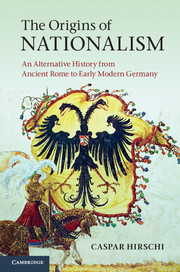Book contents
- Frontmatter
- Contents
- Figures
- Preface
- 1 Introduction
- 2 The modernist paradigm: strengths and weaknesses
- 3 Foundations of a new nationalism theory
- 4 Killing and dying for love: the common fatherland
- 5 Competing for honour: the making of nations in late medieval Europe
- 6 The nationalist transformation of borders and languages
- 7 Humanist nationalism
- 8 A German Emperor for the German people
- 9 Nation and denomination
- 10 Conclusion
- Bibliography of works cited
- Index
1 - Introduction
Published online by Cambridge University Press: 05 June 2012
- Frontmatter
- Contents
- Figures
- Preface
- 1 Introduction
- 2 The modernist paradigm: strengths and weaknesses
- 3 Foundations of a new nationalism theory
- 4 Killing and dying for love: the common fatherland
- 5 Competing for honour: the making of nations in late medieval Europe
- 6 The nationalist transformation of borders and languages
- 7 Humanist nationalism
- 8 A German Emperor for the German people
- 9 Nation and denomination
- 10 Conclusion
- Bibliography of works cited
- Index
Summary
Emperor Frederick III: ‘The Empire and the honour of Germany are so dear to me that I would spare no effort or expense. But … we have to unite the forces of our nation; we have to make of all of us one single body.’
Enea Silvio Piccolomini, Pentalogus, 1443The English is the enemy of the French, for no other reason than he is French. The Scot is the enemy of the British (Britannus), for no other reason than he is Scottish. The German is at enmity with the French, the Spanish with both. … Are we taking the common word ‘fatherland’ for such a grave cause that one people seeks to annihilate the other?
Desiderius Erasmus, A Complaint of Peace, 1517This book offers a new understanding of the historical origins of nationalism, combined with an explanation of the initial formation of European nations. It challenges the currently dominant view among historians and sociologists that nationalism is to be seen as a uniquely modern phenomenon established by industrialisation and mass communication in the nineteenth century. While acknowledging the stimulating effect of this so-called ‘modernist’ view, I argue that its leading tenets are theoretically unsound and historically untenable. The book also challenges the previous critics of ‘modernist’ theories, who advocate an integration of pre-modern periods into the study of nationalism. While recognising the validity of many of their objections, I maintain that they have so far not provided a convincing counter-theory, which could successfully challenge the modernist narrative. This book claims to present a more accurate picture of the formation of nations by developing such a counter-theory – and it also claims to offer a historical explanation of why nations and nationalism, despite all prophecies of extinction, happily endure in our seemingly post-national period.
The new model being proposed starts by re-examining the main questions a theory of nationalism is supposed to answer. Today the seemingly self-evident task of a theory of nationalism is to try to identify generic factors and mechanisms that would trigger nationalism in any given setting. If successful, this kind of theory would be able to give a definitive answer to questions such as: why did Estonia become a nation, but not Catalonia? Or, could nations exist prior to industrialisation? I believe that this sort of determinist approach promises much and delivers little, because, to name just one basic problem, it is unhistorical. There is no basis for the assumption that a single law of cause and effect produced nationalism in places as distant and different as England and East Timor.
- Type
- Chapter
- Information
- The Origins of NationalismAn Alternative History from Ancient Rome to Early Modern Germany, pp. 1 - 19Publisher: Cambridge University PressPrint publication year: 2011
- 7
- Cited by



